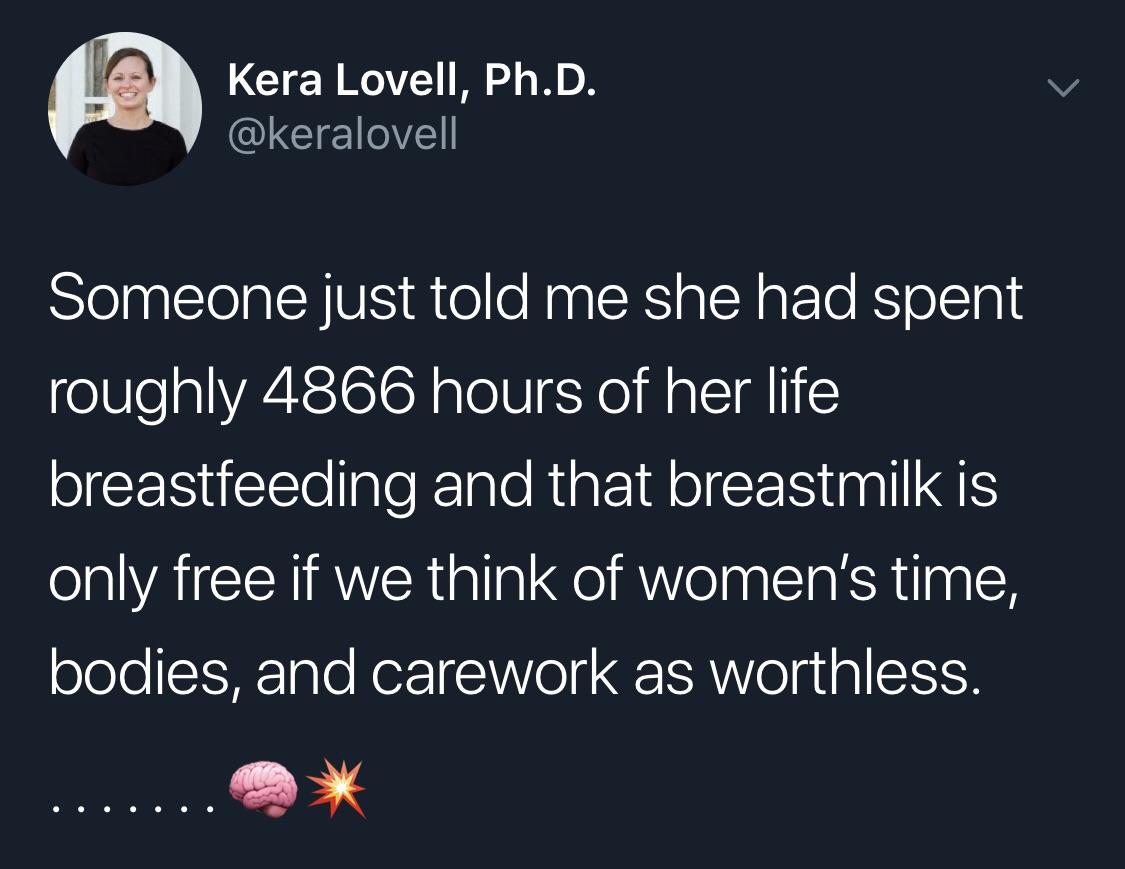this post was submitted on 05 Jul 2023
19 points (77.1% liked)
breastfeeding
77 readers
5 users here now
A place for those who are breastfeeding who want to swap stories and pics, share tips, ask questions and get support.
founded 2 years ago
MODERATORS
you are viewing a single comment's thread
view the rest of the comments
view the rest of the comments

40 hours a week, every week, for 2.5 years?
Several sources support the math that a conservative estimate is 1800 hours in a year (all babies are different ofc). A 40-hour a week job with 3 weeks of vacation, is 1960 hours a year. It’s possible that the woman in this tweet could have fed multiple babies with the number she calculated.
https://www.forbes.com/sites/amynelson1/2018/10/24/the-politics-of-breastfeeding-and-why-it-must-change/?sh=783fd4833163
https://www.romper.com/p/this-mom-figured-out-how-many-hours-shes-spent-breastfeeding-in-1-year-spoiler-alert-its-a-lot-5495036
The above number is literally just the time spent physically feeding your child. This doesn’t include the time to pump extra milk, maintain any equipment or pumps; washing and sterilising pumps and bottles, storing expressed milk safely, etc. However, some of this can be helped out by others.
Personally, I’ve found that I’ve spent countless hours on other areas too. Such as researching and purchasing pumps, nursing clothes, vitamins, creams, ointments, physical aftercare (breastfeeding HURTS until you’re “broken in”), breast pads, storage equipment, support devices etc. I’ve also researched, planned and prepared a diet for myself that promotes the best possible milk for my child. Not to mention the time spent “troubleshooting” when you are having problems; reading books, participating in forums, classes, parenting groups, travelling to and from to attend lactation consultations at your hospital, etc. Thankfully, some of this I’ve been able to multitask and achieve while being stuck under a feeding child. 😊
A major factor in such a surprisingly high number of hours per year is something called cluster feeding. Multiple times throughout your breastfeeding journey, typically before big growth spurts or developmental leaps in your child, they will have a period of intense, non-stop feeding. This is to get extra milk ready for their leap and also to signal to their mother that her milk supply needs to increase and/or change its contents (breast milk is different for different aged babies). Cluster feeding can last for several days. My personal experience with this was being trapped on the sofa feeding for hours and hours barely able to go to the bathroom or get myself enough food and drink, I definitely spent more time feeding in a few days of a cluster than I typically did for a couple of weeks combined.
Welp, this ended up a whole damn essay. I hope it helped to demonstrate the time and energy many mums put into breastfeeding.
TLDR; There’s a reason rich ladies of yonder past hired wet nurses to feed their kids - it’s hard work. :)
(Edited to add links to sources mentioned)